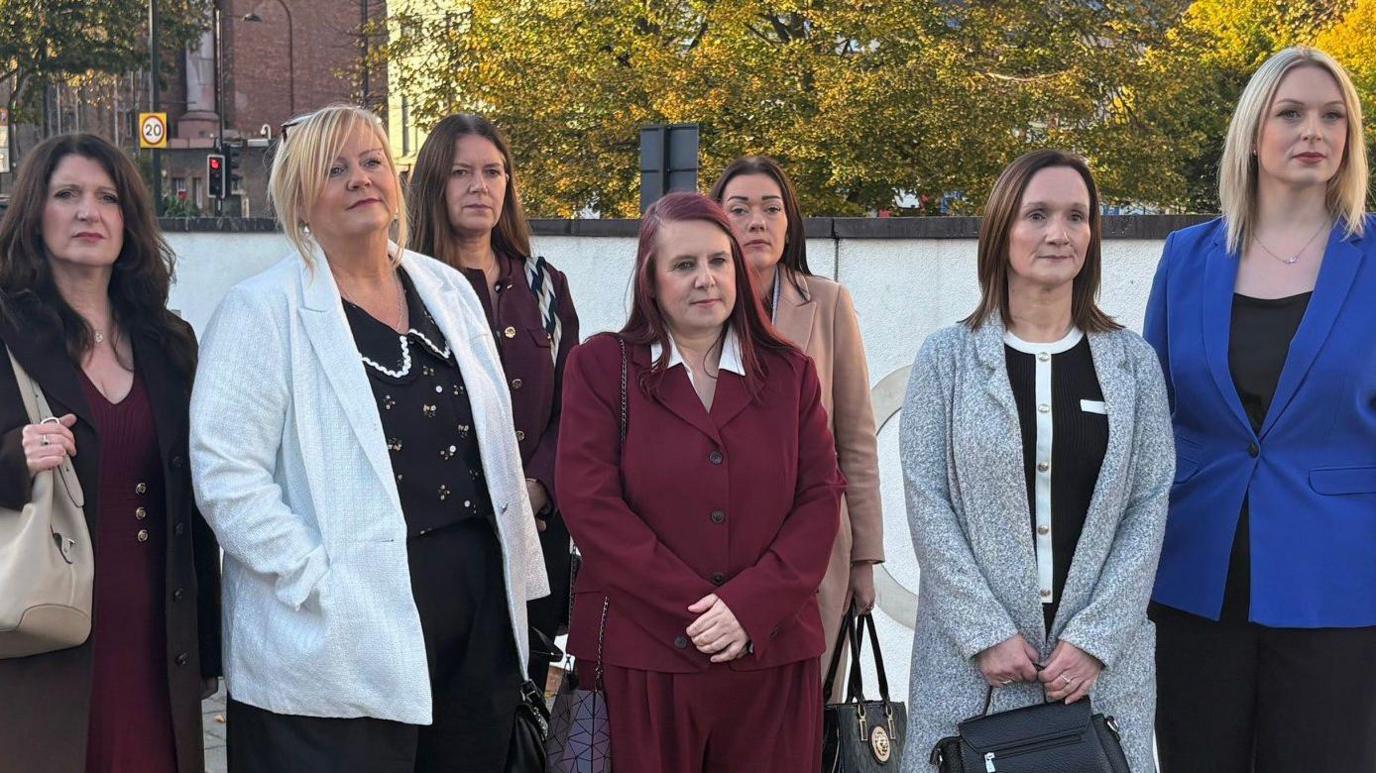Hospital 'prioritised' rights of transgender staff

Eight nurses have taken legal action over the trust's changing room policy
- Published
A hospital's policies "prioritise the rights" of transgender people to use changing rooms over those born female, an employment tribunal has heard.
Eight nurses have raised a claim against County Durham and Darlington NHS Foundation Trust over the use of changing rooms at a Darlington hospital by Rose Henderson, a biological male who identifies as a woman.
Niazi Fetto KC, for the claimants, said the trust's Transitioning in the Workplace policy allowed transgender people to use their preferred toilet and changing rooms, but those who do not wish to share a changing room with a transgender person "should use alternative facilities".
The trust denies the claims against it.
Questioning Andrew Thacker , the trust's head of human resources, Mr Fetto said: "The policy prioritises the right it gives to a biological male employee to access female changing facilities over the use of that facility by biological females."
Mr Thacker said that was "one interpretation" of the policy.
When pressed by the employment judge, Mr Thacker could not reference another part of the policy which would give an alternative meaning.
Reasonable 'distress'?
Mr Fetto also asked Mr Thacker whether it was "legitimate for female employees to expect a female-only changing room to be somewhere she could change without encountering a biological man".
Mr Thacker replied: "I guess that would be accepted."
He was also asked whether he felt it was reasonable for women to feel "distress" at having to undress "in front of a male" who had a physically larger build than them.
"I could accept that if this was a man who didn't identify as a woman," he said.
"The image you are trying to portray is there was a large-built man using the female changing room.
"Rose Henderson identifies as a woman and is using the changing room."
Mr Fetto claimed a temporary locker room made available to female staff members who did not want to encounter Rose "was not compliant with fire regulations".

Temporary lockers and a changing room were made available at Darlington Memorial Hospital
The hearing also heard from Jane Shields, who worked at Darlington Memorial Hospital but is not one of the claimants.
She asked her manager why they were "expected to share their changing room with a male?".
In a witness statement, Mrs Shields said she was told the trust had to be seen as "diverse and accepting".
"I was aware in the recent past we had a reputation of being a bullying environment for students and that students were refusing to come to Darlington as a result," she said.
"I think they just did not want to upset the apple cart or be portrayed as a 'bullying' trust."
Mrs Shields said in her statement she believed about 80% of the female staff were not happy Rose was allowed to use the changing rooms.
Did not know Rose
The employment tribunal also heard from Kirsten Coutts, who was one of 26 staff to sign a letter sent to the trust's HR department expressing concerns about transgender colleagues using the female changing rooms.
She said she did not know Rose Henderson or use the same changing room, but said she found the situation "unacceptable".
In her statement, she said transgender patients are not allowed to be put with biological women at any point during their hospital stay but were instead placed in a side room.
"This is obviously a sensible rule and it is not reasonable or fair to deny the same right to privacy to the trust's own staff," she said.
In August last year, Ms Coutts was "surprised and taken aback" when informed Rose had lodged a grievance against the 26 nurses who had signed the letter.
"In response I was officially accused of personally creating 'an intimidating, hostile, degrading, humiliating and offensive environment' for RH and threatened with disciplinary action," she said.
"I understood the trust to be effectively saying we had no right to an opinion on this issue."
The tribunal continues.
Follow BBC Tees on X,, external Facebook, external, Nextdoor and Instagram, external.
Get in touch
Do you have a story suggestion for BBC Tees?
Related topics
- Published27 October

- Published24 October

- Published23 October
